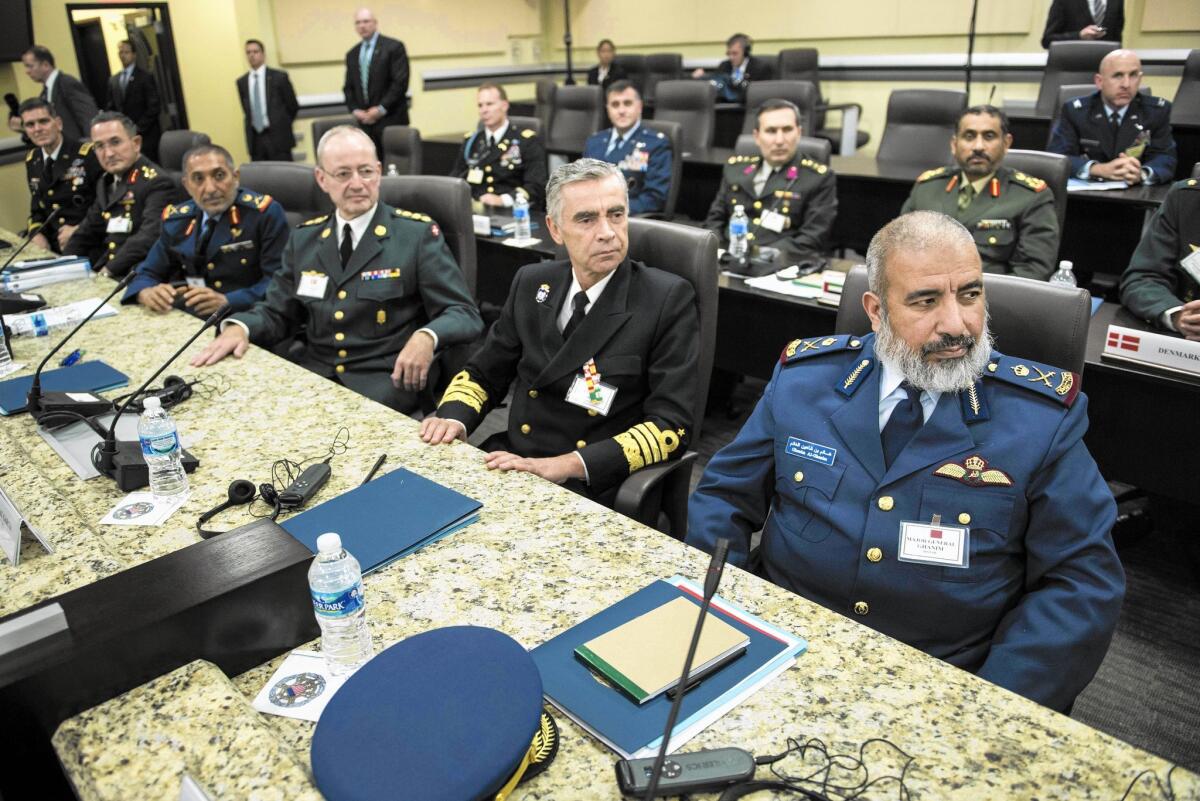No ‘quick fixes’ in battle with Islamic State, Obama says

Reporting from Washington — Amid growing signs of the limits of the U.S.-led air campaign against Islamic State militants in Iraq and Syria, President Obama appealed for the public’s patience Tuesday as he met with more than 20 defense chiefs of nations he enlisted in the struggling campaign.
Speaking to reporters after the meeting, Obama acknowledged the prospects of “periods of setback” and indirectly addressed critics who point to continued territorial gains of Islamic State forces as signs that the U.S.-assembled coalition is losing the battle against the surging extremists.
“This is going to be a long-term campaign. There are not quick fixes involved,” Obama said. “We’re still in the early stages. As with any military effort, there will be days of progress and there are going to be periods of setback. But our coalition is united behind this long-term effort.”
The reassurances were a sign of the pressure on the White House to justify a strategy that leans heavily on air power or to adjust course. Some analysts have criticized the air assault as insufficient to beat the militants, while the Iraqi security forces remain too weak to capitalize on coalition successes.
During the meeting, the defense leaders agreed that Islamic State has tactical momentum on several fronts, a military official said. In recent days, Islamic State fighters have solidified their hold on Iraq’s Anbar province and moved close to Baghdad.
Meanwhile, the Kurdish city of Kobani, on Syria’s border with Turkey, has teetered on the edge of falling to Islamic State control.
U.S. and Saudi forces carried out 21 airstrikes Monday and Tuesday near Kobani, hitting Islamic State compounds, vehicles and mortar positions. The number of strikes is three times more than what the military carried out per day over the last week and serves as an indication that the militants are moving in equipment to take over the city after a month of fighting Kurdish militia forces.
Obama told reporters that the attacks will continue in the region. His strategy relies heavily on an initial round of airstrikes to beat back Islamic State fighters, while working with allies to boost the capacity of ground forces in Iraq and, eventually, Syria through training and equipment.
For some, Obama’s long-view approach represented a fundamental disconnect between the strategy and the war being waged against Islamic State, sometimes referred to by the acronym ISIL.
“There’s a basic problem here with the U.S. strategy. That’s that we have a long-term counter-terrorism and counterinsurgency approach to dealing with ISIL, and ISIL has a short-term conquest and consolidation strategy,” said Jeffrey White, a Mideast analyst at the Washington Institute for Near East Policy. “They’re thinking in months, not years, whereas our timeline seems to be years.”
White said the threat facing the coalition forces is an Islamic State takeover of the Sunni Muslim towns around Baghdad or a major assault on Baghdad’s international airport. Either would press the White House to engage U.S. special forces in missions that might test the president’s promise not to put in ground combat forces.
Officials described Tuesday’s meeting as a coordination session for the coalition in the 2-month-old campaign. It was one of several convened over two days by Gen. Martin Dempsey, chairman of the Joint Chiefs of Staff, for visiting counterparts from Britain, Canada and France, as well as the Sunni Arab governments — Saudi Arabia, the United Arab Emirates, Jordan, Bahrain and Qatar — that joined the fight last month. The group also was to discuss the name of the operation, which could be announced this week.
Secretary of Defense Chuck Hagel, who was flying back from a climate change meeting in Peru, did not attend.
The president said the military leaders agreed that the effort to defeat Islamic State required nonmilitary tactics, including education campaigns and anti-extremism outreach to young people, as well as political reforms in Baghdad.
Obama sounded optimistic notes, but some military officials have been more cautious. Asked Monday whether he was confident Baghdad was safe from a major attack, Army Chief of Staff Gen. Ray Odierno made no predictions.
“The capability is there to defend Baghdad,” he said. “And so I think we’re somewhat confident in that, but we’ll have to wait and see what plays out over the coming days.”
Administration officials say the second phase of Obama’s strategy — the equipping of proxy forces — is in its infancy, particularly in Syria, and attribute the situation in Kobani to the lack of well-trained fighters there.
White House spokesman Josh Earnest acknowledged that the city has strategic and symbolic importance, but he downplayed expectations that the U.S. would protect it at all cost.
“Our capacity to prevent that town from falling is limited by the fact that airstrikes can only do so much,” he said. “Airstrikes can ... have an effect and have an impact, and they already have, but they are made more effective when there is a ground force that can take the fight to ISIL in the aftermath of those kinds of airstrikes. That ground force doesn’t yet exist.”
The White House is eager to show progress on that second phase. Earnest said Tuesday that the Department of Defense had a team in Turkey working to set up its promised training operation there.
Times staff writer W.J. Hennigan in Arequipa, Peru, contributed to this report.
Twitter: @khennessey
More to Read
Sign up for Essential California
The most important California stories and recommendations in your inbox every morning.
You may occasionally receive promotional content from the Los Angeles Times.











